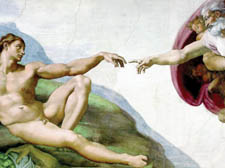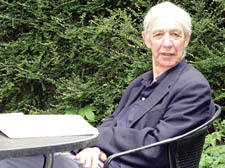 How we came to believe in the things we believe How we came to believe in the things we believe
Lewis Wolpert doesn’t believe in God, but says religion is in our genes writes Gerald Isaaman.
Lewis Wolpert went to synagogue as a lad in Johannesburg, had a barmitzvah and enjoyed the Jewish holidays. Then he became a devout
 aethist for the simplistic of reasons – and remains one today, now aged 76 and with a reputation as an academic who has been honoured for promoting the cause of science. aethist for the simplistic of reasons – and remains one today, now aged 76 and with a reputation as an academic who has been honoured for promoting the cause of science.
“I gave up religion because I prayed to God and nothing happened,” he explains. “I expected something, of course, but I didn’t get a response.”
Yet the question that has always begged and bugged him is: Why do people believe in something, whether it be one of the great religions, the supernatural, paranormal, witchcraft, homeopathy or even angels, let alone leprechauns and invisible friends?
Why do millions turn to astrology for answers, why are some scientists superstitious, reason rarely triumphing over irrational thoughts? Indeed, Neils Bohr, the Nobel-winning physicist, kept a horseshoe nailed on his wall.
When asked why, he replied that he had been told it would bring him good luck even if he didn’t believe it. “How can one argue with such logic?,” demanded the atomic scientist.
And the conundrum was confused further when Wolpert’s own teacher son Matthew became a fundamentalist Christian, poignantly telling his father he was envious because his father would die first and Matthew, convinced he was heading for heaven, would have to wait to find nirvana.
“I never tried for a single second to persuade him not to be religious,” Wolpert tells me at his flat in Belsize Park Gardens, Hampstead, his home for more than 20 years.
“Religion helped him a great deal, while my attitude, if I thought about it, is that I don’t see much evidence of God. I am not hostile to religion but I personally felt the Jewish religion was confining, restrictive and making people unhappy, including my mother, who was so very upset when I wasn’t married in a synagogue.
“Religion has done great damage in the world but I also think it has helped a tremendous number of people.”
In the same way too, he objects to the invasion of Iraq but believes that George Bush, a religious president, and America, a religious nation, does as much good in the world as harm. It is a difficult balance, he concedes.
After three years of research, Wolpert, a developmental biologist at University College London, has traced the origins of belief back to hominid man, who, along with chimpanzees, discovered the use of tools, and also of language, because as human minds grew there was a need for a casual explanation of what seemed magical, what is now called the cognitive imperative, an instinct that links cause and effect that has become wired into our brains.
“That’s what saved human kind, that’s what made us human,” he insists. “I think religion is in our genes and there’s absolutely no chance of it ever going away.”
Adam and Eve, Mohammed and Vishnu won’t disappear, nor the irrational fear of walking under a ladder, touching wood or our instinctive reactions to natural disasters or our false beliefs about mental illness, something Wolpert is close to as he has suffered from depression for a decade, something that inspired a brilliant BBC television series about sadness.
He takes the wonderful title of his book from Lewis Carroll’s Through the Looking Glass, the White Queen advising Alice to believe in the improbable and produce “six impossible things before breakfast”.
His admirable book presents a challenging welcome and fascinating theory, is written with scholarly wit and style, plus the blinding clarity that stimulates both personal introspection and open public debate. Yet, if you embrace his argument, it fails to answer one fundamental question. What came first, the flint scraper and axe or the recognition of their use as man has progressed through war and wonder over millions of years? We shall never know.
However, as Wolpert points out: “There will always be mysteries in life. However much we understand, there will always be something that we don’t…”
So here’s a wonderful chance, not to be missed, to do some magical thinking with your muesli. As the Roman playwright Terence pointed out: “You believe that which you hope for earnestly.”
|

 aethist for the simplistic of reasons – and remains one today, now aged 76 and with a reputation as an academic who has been honoured for promoting the cause of science.
aethist for the simplistic of reasons – and remains one today, now aged 76 and with a reputation as an academic who has been honoured for promoting the cause of science.